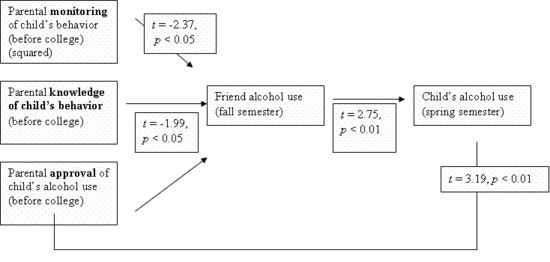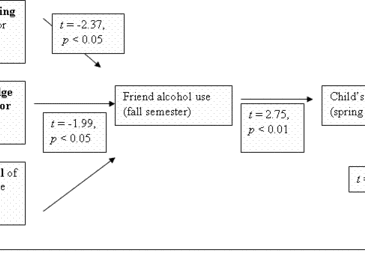Alcohol abuse is a major problem on American college campuses (Knight et al., 2002). Researchers have suggested that peer influence might outweigh parental influence as adolescents develop into adulthood (Wood et al., 2001). This week’s DRAM reviews a study of how parents might indirectly shape college students’ alcohol use and abuse by influencing their children’s selection of peers (Abar & Turrisi, 2008).
Participants
• Participants were 392 prospective college freshmen (57% female, 90% Caucasian, mean age = 18) who were part of a larger study examining college student drinking (Turrisi et al., 2001).
• Researchers randomly selected participants from all public and private school yearbooks in the sampling areas. The authors do not report the response rate or the retention rate.
Measures
• Once during the summer before college, participants completed by mail multi-item 3-point scales of:
Parental knowledge of behavior (e.g., “How well do your parents know where you go at night?”)
Parental monitoring of behavior (e.g., “How hard do your parents try to know where you go at night?”)
Parental approval of alcohol use (e.g., “How would your parents feel if you drank one or two drinks every day?”)
• Once during the fall semester, participants described how many of their friends use and abuse alcohol using a 5-point scale ranging from “None” to “Nearly all.”
• Once during the spring semester, participants completed a scale describing their own alcohol use (e.g., drinks per day, days drunk in the past month).
Method
• The authors used structural equation modeling (SEM) to explore the relationships among the variables.
Results

Figure. Hypothesized model of the relationships among parental involvement, friend alcohol use at college, and child’s alcohol use at college. Statistically significant pathways are indicated by text boxes. Click image to enlarge.
• The data generally support the hypothesized model (chi square (205) = 446.65, p < 0.001, CFI = 0.96).
• In particular, decreased parental knowledge and monitoring of the child’s behavior during the summer before college was associated increased selection of alcohol-using-peers during the fall semester, and increased selection of alcohol-using-peers during the fall semester was associated with increased child alcohol use during the spring semester.
• Increased parental approval was associated with increased child alcohol use during the spring semester.
Limitations
• Data, including estimates of parental involvement, were derived from participants’ self report.
• The authors did not assess perceived quality of monitoring and cannot establish whether the child understood, appreciated, and internalized the parental involvement, or instead saw it as intrusive.
• The sample has limited generalizability (i.e., was 90% Caucasian).
• Because the authors do not provide information on retention rates or characteristics of dropout, it is unclear whether missing observations might confound the findings.
Conclusion
Children with parents who were more approving of alcohol use were more likely to drink during the spring semester at college. Children with parents who were less involved in their children’s lives chose more first-semester friends who used and abused alcohol, and having friends more involved with alcohol predicted more use and abuse of alcohol during the spring semester. Because these results illustrate some ways in which parents and peers shape drinking behavior, they might be of interest to both parents and intervention scientists who are concerned with finding ways to reduce risky drinking behavior on campus.
—Heather Gray
What do you think? Please use the comment link below to provide feedback on this article.
References
Turrisi, R., Jaccard, J., Taki, R., Dunnam, H., & Grimes, J. (2001). Examination of the short-term efficacy of a parent intervention to reduce college student drinking tendencies. Psychology of Addictive Behaviors, 15(4), 366−372.





alcohol rehabilitation April 17, 2009
The problem individual who have alcohol problems is that they does not know that there is a problem and they thought that parents only make a big fuss about it saying they can handle it. The major concern is how to deal this kind of individuals. Friends would give the most impact on someone who is abusing alcohol. I’m not saying that parent don’t matter anymore I’m just saying that at that stage of person friends gives the most influence.